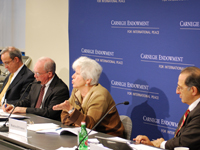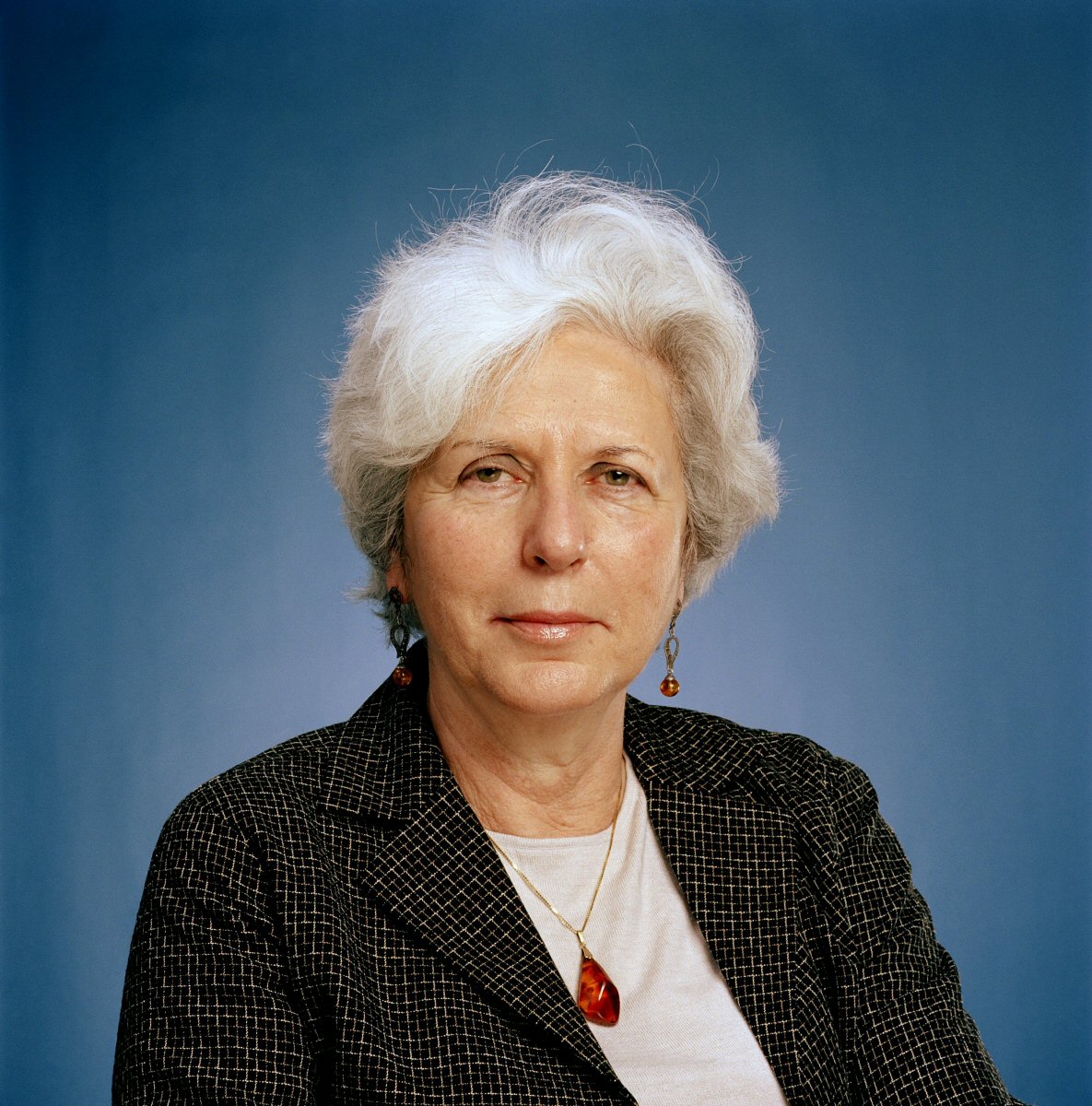{
"authors": [
"James Zogby",
"Edward Gnehm Jr.",
"Mustafa Hamarneh",
"Marwan Muasher",
"Marina Ottaway"
],
"type": "event",
"centerAffiliationAll": "",
"centers": [
"Carnegie Endowment for International Peace",
"Malcolm H. Kerr Carnegie Middle East Center"
],
"collections": [
"Arab Awakening"
],
"englishNewsletterAll": "",
"nonEnglishNewsletterAll": "",
"primaryCenter": "Carnegie Endowment for International Peace",
"programAffiliation": "",
"programs": [
"Middle East"
],
"projects": [],
"regions": [
"Middle East",
"Iran",
"North Africa",
"Egypt",
"Tunisia",
"Iraq",
"Lebanon",
"Jordan",
"Saudi Arabia",
"United Arab Emirates",
"Gulf",
"Levant",
"Maghreb"
],
"topics": [
"Political Reform",
"Democracy"
]
}
Public Opinion on Iraq and the Arab Spring
Mon, December 19th, 2011
Washington, D.C.
IMGXYZ3368IMGZYXIn September, Zogby Research Services conducted polling in eight countries across the Middle East and North Africa, as well as in the United States. The survey looked at public opinion on the Arab Spring, the U.S. withdrawal from Iraq, and other recent developments in the region.
Carnegie convened two panels to discuss the poll’s findings on how people in the Middle East, North Africa and the United States viewed the U.S. presence in Iraq and the Arab Spring. The Arab American Institute’s James Zogby discussed the results of the poll with Ambassador Edward Gnehm Jr., Kuwait Professor of Gulf and Arabian Peninsula Affairs at the Elliott School of International Affairs, and Carnegie’s Marina Ottaway and Marwan Muasher.
Public Opinion on Iraq
- Divergent Attitudes: Zogby explained that the poll highlighted sharp differences between groups in how they viewed the U.S. presence in Iraq, including divergences between Shias and Sunnis versus Kurds, Democrats versus Republicans in the United States, and respondents in neighboring nations versus citizens of Iraq. For example, 42 percent of the Iraqi people felt that the war had left them worse off, but 60 percent of the Kurdish population felt the American intervention had left them better off. Similarly, Kurds believed that the United States has had a largely positive effect on Iraqi safety and security, while Shias noted only a slightly positive impact, and Sunnis viewed the effect as negative overall.
- Withdrawal: While the majority of Americans were happy that the United States has withdrawn from Iraq, a plurality of Iraqis expressed concern about this withdrawal, Zogby said. Ottaway noted, however, that approximately one-third of Americans do not have a clear conception of the developments in Iraq.
- Post-Withdrawal Concerns: 65 percent of Iraqis worry that the country will devolve into civil war after the American withdrawal. Iraqis also expressed concern that the country might split or become dominated by a neighboring nation, or that there might be an increase in terrorism, economic deterioration, or the loss of religious freedoms, Zogby said. Ottaway added that since the polls were taken in September, there has been an increase in violence. She added that things are falling apart faster than anyone expected.
- Who Benefitted from the War: 39 percent of Iraqis view the United States as a prominent beneficiary of the war, Zogby added. A significant number of Jordanians polled felt the same way, added Gnehm, explaining that Jordanian concerns about the U.S. intervention stem from the disruption of economic trade relations and the influx of Iraqi refugees into Jordan.
- Attitudes Towards Iraqi Leaders: Among Iraqi leaders, Muqtada Al-Sadr is favored the most by Shias in Iraq, Zogby reported. However, Iyad Allawi had the best rating of any Iraqi figure overall, with strong support from both the Sunnis and Kurds. Ottaway pointed out that since the polls were taken in September, the context in the country has begun to change. For example, the Iraqiya alliance is no longer a part of the government coalition and arrest warrants have been put out for many prominent political figures.
- Kuwait: Gnehm highlighted polling results from Kuwait as unique; Kuwaitis expressed a preference for the United States to stay in Iraq for as long as possible. The country’s fears about Iraqi stability and aggression have been slightly addressed by the presence of American troops in Kuwait, he added.
- A Model for Democracy: Since the beginning of the U.S. intervention, Iraq has been structured through a sectarian lens, rather than a democratic one, Zogby said. For this reason, Tunisia today is a better example of an Arab democracy than Iraq. Gnehm added that the way events unfolded in Iraq may have actually hurt the image of democracy in the region. Zogby concluded that ultimately, the polls indicate that it is the Arab Spring and not Iraq that brought democracy into the regional conversation.
Public Opinion on the Arab Spring
- Employment: Overall, Zogby found that employment is the chief issue of concern in all polled countries aside from the UAE. Muasher noted that 70 percent of the Arab population is under the age of 30, a demographic which explains the growing need for employment.
- Issues Facing the Region: Aside from employment, political rights and corruption are increasingly cited as chief concerns for all nations polled, Zogby said. He cited some country specific results:
- Iran: For respondents in Iran, six of the seven top issues were democracy-related.
- Tunisia: Respondents listed women’s rights as the fourth most critical issue facing the country, indicating the Tunisian cultural commitment to the status of women. Muasher expressed dismay that this was, unfortunately, not the case with many neighboring Arab nations who do not see women’s rights as important.
- Egypt: The top four issues cited by respondents have not changed since the last poll, indicating that there is a possible disconnect between the protesters, who are calling for rights and democracy, and the majority of the population, who cited food and basic needs as their top concerns.
- Iran: For respondents in Iran, six of the seven top issues were democracy-related.
- On the Right Track: While a high percentage of the population in the UAE, Egypt, Jordan, and Saudi Arabia see their countries as heading on the right track, this is not the case for Tunisia, Iraq, Iran, and Lebanon, Zogby said.
- Economic and Political Reform: Muasher highlighted the importance of simultaneous economic and political reform, stating that the polls do not mean that political reform is unimportant to the people.
- Israel-Palestine: An emphasis on political reform in the region does not mean that the conflict between Israel and Palestine is no longer an important issue, Muasher warned.
- Social Media: Both the internet and traditional media played an important role in the revolutions of the Arab Spring, but it would be simplistic to label the Internet as the primary driver of the revolution, stated Muasher. Zogby agreed, adding that social media allowed information to spread information quickly and provided a voice for those who are often blocked out by more traditional sources. He also added that both pro-government and anti-government forces used social media to their benefit.
- Youth Movement: Muasher stated that the involvement of youth in the revolutions is indicative of a rising phenomenon in the Arab world. While the youth are unafraid of taking to the streets, they also lack political organization, he added. Until they are able to better organize, the path to pluralism will be delayed.
Carnegie does not take institutional positions on public policy issues; the views represented herein are those of the author(s) and do not necessarily reflect the views of Carnegie, its staff, or its trustees.
Event Speakers
James Zogby
Edward Gnehm Jr.
Mustafa Hamarneh
Marwan Muasher is vice president for studies at Carnegie, where he oversees research in Washington and Beirut on the Middle East. Muasher served as foreign minister (2002–2004) and deputy prime minister (2004–2005) of Jordan, and his career has spanned the areas of diplomacy, development, civil society, and communications.
Before joining the Endowment, Ottaway carried out research in Africa and in the Middle East for many years and taught at the University of Addis Ababa, the University of Zambia, the American University in Cairo, and the University of the Witwatersrand in South Africa.

